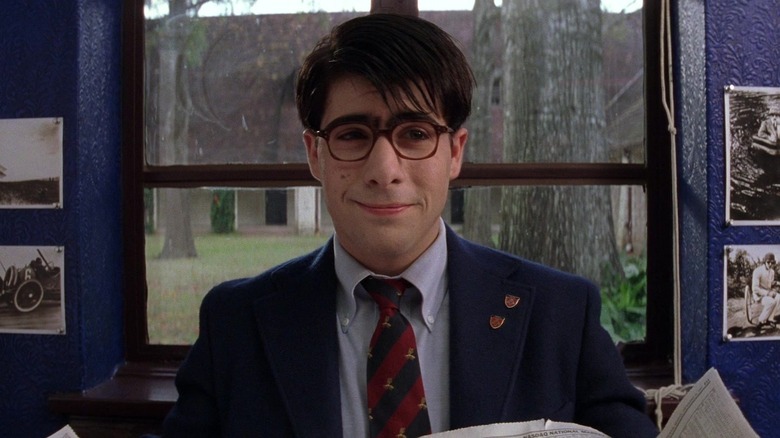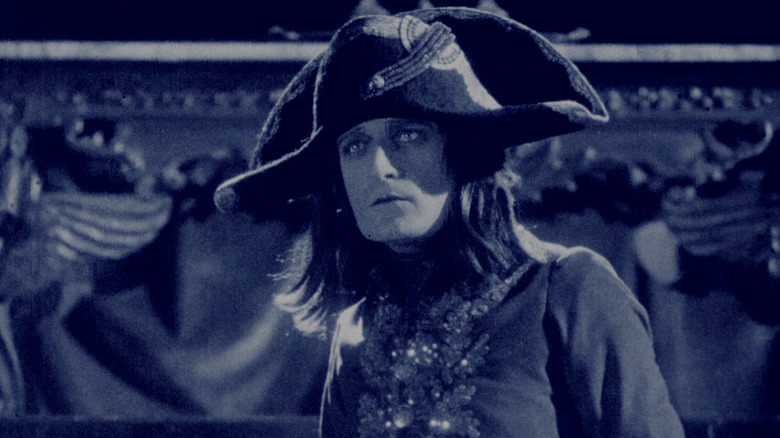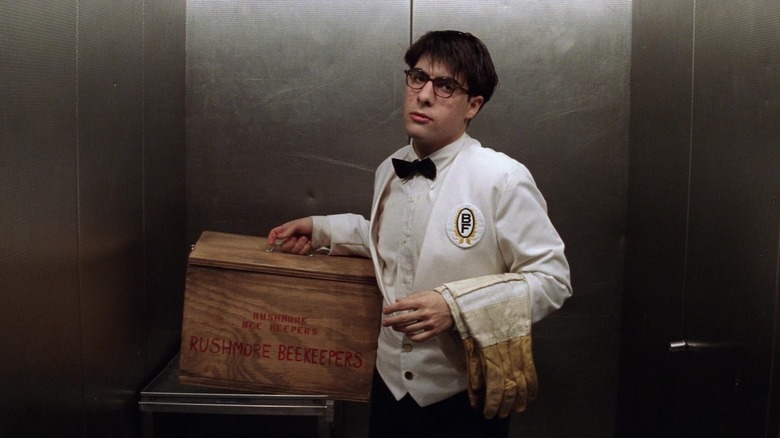How A 1920s Historical Epic Landed Jason Schwartzman His Role In Wes Anderson's Rushmore
I think it's safe to say the Coppolas are the designated First Family of Hollywood. Francis Ford Coppola, Talia Shire, Sofia Coppola, and Nicolas Cage scratch the surface of the vast network of Coppolas in show business. They even have their own Wikipedia page for a family tree. That's how wide-reaching they are. Also in that family is Jason Schwartzman, the son of two-time Oscar nominee Talia Shire and producer Jack Schwartzman.
To us, Schwartzman has become a character actor on whom you can always rely to deliver something slyly funny and totally off-beat, and he has found a kindred spirit in director Wes Anderson, with whom he has collaborated for 25 years. Schwartzman's first ever film was as the lead of Anderson's second feature "Rushmore," where he played a pompous high school student in love with a teacher at his school, and he even went toe-to-toe with Bill Murray. Since then, he has worked on nearly every subsequent Anderson project, not to mention being a frequent co-writer with another family member in Roman Coppola.
It may seem hard to believe, but it was not Jason Schwartzman's intention to become a Hollywood guy. Before "Rushmore," he didn't even think he would be an actor. He was a teenager who liked to play the drums (and he did, as a member of Phantom Planet, the band behind the theme song for "The OC"). So how did he end up going down the acting path? Well, Jason Schwartzman has to credit another member of the family for that: his grandfather Carmine Coppola. He was a composer who frequently worked with his son Francis. Among their collaborations was a reedit of the 1927 French epic "Napoléon," directed by Abel Gance, in 1980. Carmine Coppola composed the score for that version of the film, and it was a screening of that version 17 years later which put Jason Schwartzman in the mind of a casting director.
A brief history of 'Napoléon'
Back in the day, film preservation wasn't top of mind for people. There was no streaming, Blu-ray, DVD, or anything. A movie would run in a cinema as long as theaters wanted to show it. Film prints degraded or were destroyed. The amount of movies made throughout the years lost to time is incalculable. Even some of the most celebrated films of all time have had to be cobbled together over decades of uncovering footage to get close to what was originally shown to audiences, such as Fritz Lang's "Metropolis."
Abel Gance's "Napoléon" has one of the most tumultuous paths in the history of the medium. Over the years, versions of "Napoléon" have existed with running times ranging from a paltry 111 minutes released by MGM in the US in 1929 to the incomprehensibly robust 562 minutes originally edited by Abel Gance himself. If you were to watch "Napoléon" now, the cut you will be seeing is about 330 minutes, thanks to the work of filmmaker and historian Kevin Brownlow. His first crack at putting together "Napoléon" premiered in 1980 with a score by Carl Davis. This version ran 290 minutes and was entirely black and white. He uncovered more footage from the film throughout the years and released new cuts in 1983, 2000, and 2004. The later ones introduced the toned coloring of the film. It's still not the original version of the picture, but filmmakers everywhere recognize the staggering achievement on display.
Brownlow's original 1980 cut is important because that is where Francis Ford Coppola comes in. Using that cut as a basis, Coppola created his own cut of "Napoléon," and instead of using Davis' score, he brought in his father Carmine to compose new music.
A rep screening meeting
Coppola's version of "Napoléon" didn't become the canonical version of the film as Kevin Brownlow's did, but it still received play from time to time. In 1997, not only was it getting a repertory screening, but this was a special screening in which Carmine Coppola's score was to be played by a live orchestra along with the picture. As this was a rare occurrence, the Coppolas were in attendance, including 17 year-old Jason Schwartzman. Little did he realize that this screening would change his life. Speaking with Dazed, he recounted the wild events of that evening:
"This woman named Davia Nelson was doing the Northern California casting for 'Rushmore.' Davia was talking to my cousin, Sofia (Coppola), and she said, ... 'I'm casting this movie called "Rushmore" and we are looking for a 15-year-old teenager who is a playwright and in love with this older woman.' Just the summer before, I had written a play and directed it and I was in love with my nanny, like deeply. And Sofia said, 'Oh, that's funny. That sounds like my cousin, Jason.' ... Then, while I was talking to her, the clown in me was like this could just be a crazy experience that I can like talk about – it could be fun. I'm not gonna get it so I should just try it! I wrote down my address in LA and she sent the script to my home in LA and it was the first script I'd ever read."
What started out as a lark turned into an acting career over two decades long without no signs of slowing, and Jason Schwartzman will appear in Wes Anderson's, "Asteroid City" in 2023 They have now made over 10 projects together.


